| Srl | Item |
| 1 |
ID:
149061
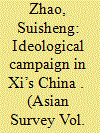

|
|
|
|
|
| Summary/Abstract |
President Xi Jinping has launched the largest ideological campaign in post-Mao China, which has brought a Maoist revival. But Xi is not in a position to make a full return to the Mao era because ideologically driven repression offers no long-run solution to China’s problems. Drawing on elements of Mao’s legacy, Xi aims to rebuild the regime’s legitimacy when it is increasingly vulnerable to economic slowdown and public anger about corruption, income disparity, and pollution, an embarrassing confession of regime fragility.
|
|
|
|
|
|
|
|
|
|
|
|
|
|
|
|
| 2 |
ID:
165095


|
|
|
|
|
| Summary/Abstract |
What factors do autocracies evaluate when responding to perceived threats and why might they fail to balance appropriately? I posit that autocratic leaders may choose greater exposure to an external threat if, by doing so, it preserves regime legitimacy. Specifically, the desire to promote a positive image to one’s domestic public creates incentives to publicly downplay a rival’s military progress, which then affects the state’s ability to mobilize resources to respond to the growing threat. I test this theory in the case of China’s response to India’s military rise. This research contributes to balancing theory and empirical work on East Asian security.
|
|
|
|
|
|
|
|
|
|
|
|
|
|
|
|
| 3 |
ID:
143560
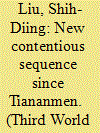

|
|
|
|
|
| Summary/Abstract |
In the aftermath of the crackdown in Tiananmen, China’s political landscape has witnessed a new protest cycle. Unrest has escalated as a consequence of the reconfiguration of the Party-state, which has to deal with an increasingly restive society. The protest politics since the 1990s has unfolded with a set of distinctively different patterns, dynamics and consequences alongside with the transformation of the Party-state. This paper gives an account of the emerging new contentious sequence, with an emphasis on how the transformation of the Party-state has facilitated the conditions for popular resistance. The distinctiveness of the new sequence rests in the ambivalent relationship and strategic engagement with the decentralised Party-state, which has increasingly accommodated mass protest to recapture regime legitimacy. Profound changes in state governance and state–society linkages, the central–local divide, as well as the socialist tradition have all combined to reshape the conditions for contemporary popular struggle in China.
|
|
|
|
|
|
|
|
|
|
|
|
|
|
|
|
| 4 |
ID:
156634


|
|
|
| 5 |
ID:
077033
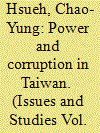

|
|
|
| 6 |
ID:
090092
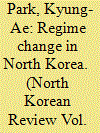

|
|
|
|
|
| Publication |
2009.
|
| Summary/Abstract |
The structuralist perspective of regime change looks at economic constraints as the principal explanatory variable of regime collapse, suggesting that both economic crisis and economic reform give rise to political pluralism, activate civil society, and thus lead to regime change. The Kim Jong Il regime in North Korea escaped its collapse in spite of the prolonged economic crisis. The article offers an analysis of North Korean exceptionalism in regard to the economic crisis and economic development theories of regime change. It argues that several components of political opportunity structures salient to North Korea work as constraints of regime change, and offers an assessment of prospects for activation of North Korea's civil society. An earlier version of this article was published as "Regime Change in North Korea?," in T. Roehrig, J. Seo, and U. Heo, eds., Korean Security in a Changing East Asia (New York, NY: Praeger, 2007), pp 70-92.
|
|
|
|
|
|
|
|
|
|
|
|
|
|
|
|
| 7 |
ID:
120403
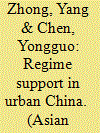

|
|
|
|
|
| Publication |
2013.
|
| Summary/Abstract |
Why has the Chinese regime been resilient in the most populous country in the world? Based on survey data collected from five large Chinese cities, this study finds that a majority of Chinese urban residents show a certain degree of support for the current political regime and do not favor fundamental regime change. This diffuse regime support is largely determined by satisfaction with government performance in a number of policy areas that affect people's daily lives.
|
|
|
|
|
|
|
|
|
|
|
|
|
|
|
|
| 8 |
ID:
108417
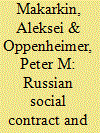

|
|
|
|
|
| Publication |
2011.
|
| Summary/Abstract |
The social contract in Soviet and post-Soviet Russia has concerned not classical political rights but socio-economic issues. Loyalty is accorded to the powers-that-be partly from fear of repression, but also in return for new opportunities of advancement-whether resulting from social upheaval or from educational expansion-and for modest improvements in living standards. The Soviet era ended when such benefits could no longer be delivered, on account of lower oil prices, arms-race burdens and lagging productivity and innovation. After the turmoil of the 1990s, the contract was re-established under Putin in the early 2000s. Public opinion accepts relatively authoritarian rule if economic stability appears guaranteed in return. Moreover, world events from 2008 onwards have dampened economic expectations. Nonetheless, the sustainability of the present contract is doubtful, with economic modernization likely to prove elusive in the absence of effective democratic institutions.
|
|
|
|
|
|
|
|
|
|
|
|
|
|
|
|
| 9 |
ID:
133032
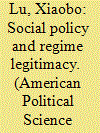

|
|
|
|
|
| Publication |
2014.
|
| Summary/Abstract |
Elites often use social policies to garner political support and ensure regime survival, but social policies are not a silver bullet. Using two waves of Chinese national surveys, I find that a recent policy of abolishing school fees has significantly increased citizens' demand for greater government responsibility in financing compulsory education. I argue that policy awareness, rather than policy benefits, drives citizens' demand. Finally, I show that policy awareness has enhanced citizens' trust in China's central government, but not in local governments. This asymmetry in regime support has two sources-the decentralization of education provision and biased media reporting-which induce citizens to credit the central government for good policy outcomes. Given that citizens' responses are primarily influenced by policy awareness that is promoted by the state media, this study casts doubt on the use of social policies to sustain long-term political support.
|
|
|
|
|
|
|
|
|
|
|
|
|
|
|
|
| 10 |
ID:
119236
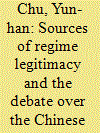

|
|
|